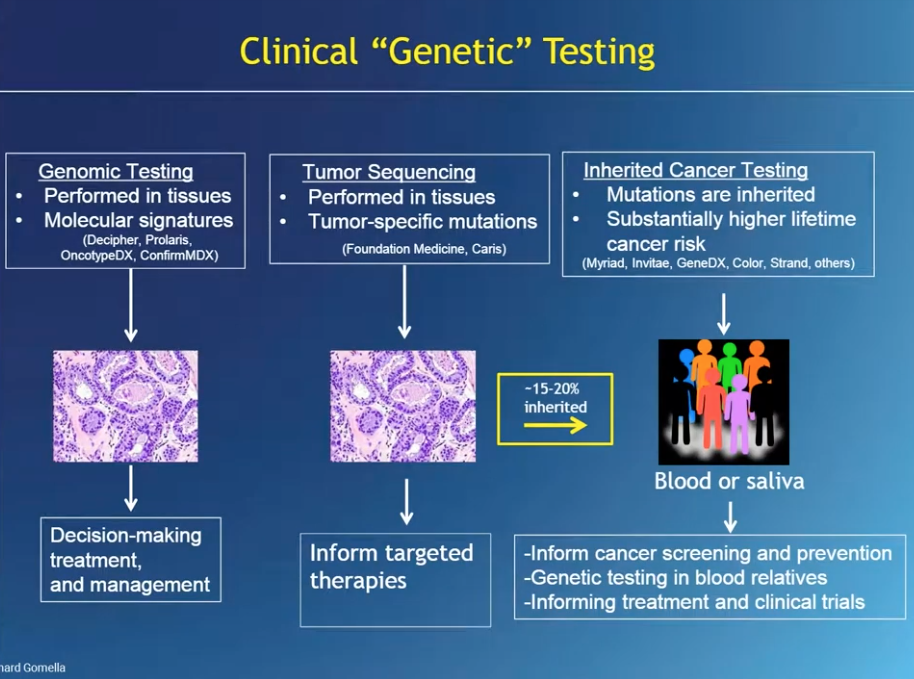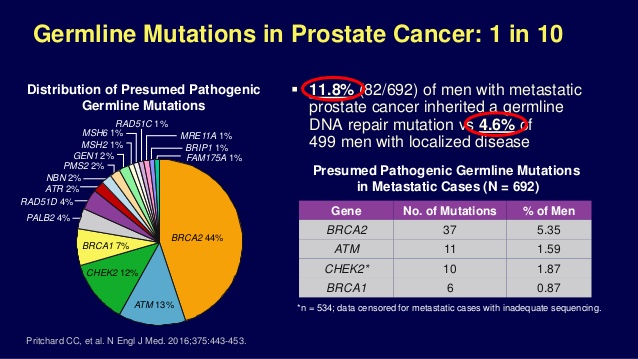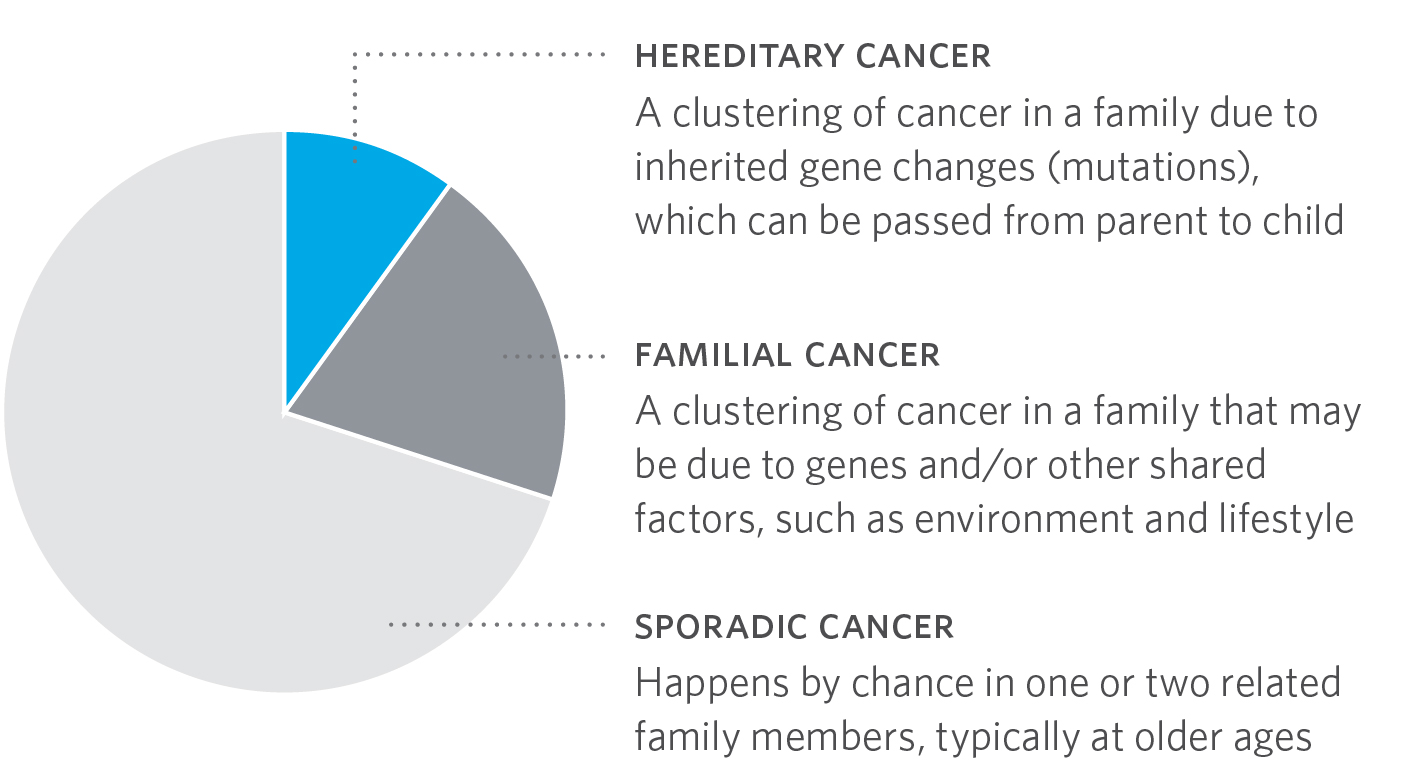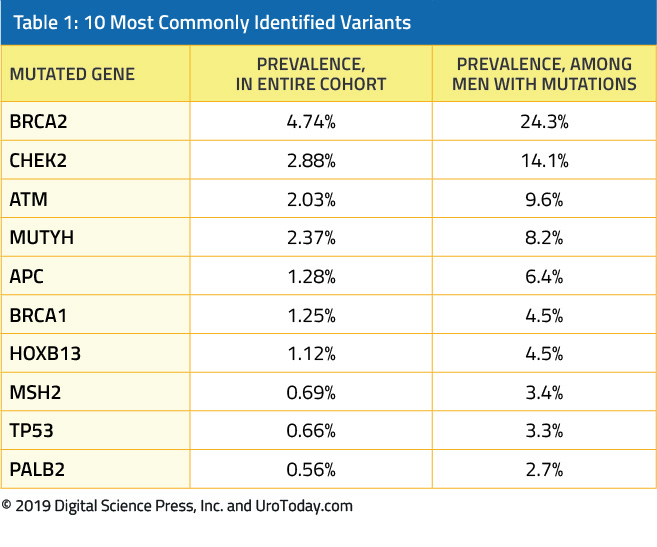Prostate cancer tends to be more aggressive in men who have certain inherited genetic mutations compared with men without these inherited mutations. Of those men 31 of the mutations were in the BRCA genes.
 Genetic Precision For Prostate Cancer Patients Guides Decisions
Genetic Precision For Prostate Cancer Patients Guides Decisions
Inherited genetic mutations and syndromes cause between 5 and 10 percent of prostate cancers according to the American Cancer Society.

Is prostate cancer genetic. Over 50 genes have been identified that malfunction in prostate cancer. 1 multiple affected first-degree relatives FDRs with prostate cancer including three successive generations with prostate cancer in the maternal or paternal lineage. Having one of these genetic defects does not mean you will get prostate cancer but it does increase the.
Factors suggestive of a genetic contribution to prostate cancer include the following. Prior to the genetics department being directly involved with genitourinary medical oncology at UCSF approximately 850 men with metastatic prostate cancer were seen annually in their departments. Because of this the National Comprehensive Cancer Network NCCN suggests that all men over age 45 should discuss screening for prostate.
Genetic analysis of tumor tissue shows that in the average cancer cell about four genes are found to be mutated. And 3 prostate cancer with a family history of other cancers eg breast ovarian pancreatic. Some mutations occur spontaneously when cells in the body copy their genetic material and an error is introduced into a gene.
These are called somatic mutations. These changes which are called somatic mutations are not inherited. You can learn more about the basic concepts of hereditary cancer by reading our notre article on the subject.
16 2011 -- Researchers in Seattle and Sweden have identified five inherited genetic markers that could help spot men with the most aggressive and. If prostate cancer was caused by an inherited gene mutation it is defined as hereditary cancer. November is Prostate Cancer Awareness Month so we would like to share some genetic information.
That said a large majority of these cancers around 75 1are. That means there is a greater chance of the disease running in the family. Identifying if you have a germline mutation impacts current and future treatment decisions.
1 in 9 men 11 will develop prostate cancer in their lifetime and the diagnosis usually occurs between 65 and 74 years old. Men with hereditary prostate cancer are 6 times more likely to die from their disease and 4 times more likely to develop metastasis within 5 years. The answer may lie in the dozens of genetic mutations or variants that have been associated with varying degrees of prostate cancer risk as well as the additional suspect genes that are being researched.
Family history is the strongest risk factor for prostate cancer. Inheriting prostate cancer All cancers are caused by the accumulation of genetic mutations that cause or allow a cell to grow out of control and become a tumor. Thanks to research funded by the Prostate Cancer Foundation we now know that some prostate cancers are caused by genetic mutations.
Genetic testing is available for certain genes that can cause prostate cancer. In most cases of prostate cancer these genetic changes are acquired during a mans lifetime and are present only in certain cells in the prostate. About 5 to 10 percent of all prostate cancers found are hereditary.
Somatic mutations in many different genes have been found in prostate cancer cells. They have been offering germline genetic testing for inherited cancer. Men from families with prostate cancer breast cancer or ovarian cancer can talk with their doctors about their risk and genetic counseling.
A man with one close relative with prostate cancer for example a father or a brother is twice as likely to develop prostate cancer as a man with no family history of the disease. It is currently estimated that 13 of men in the United States will develop prostate cancer within their lifetime1 making it the most common cancer that occurs in men. In contrast prostate cancer has one of the highest heritabilities of all major cancers.
The knowledge that the same genetic mutations that increase the risk of breast ovarian colon and pancreatic cancers can also cause prostate cancer is helping inform how we. Numerous genetic susceptibility markers have been identified from family-based studies candidate gene association studies and genome-wide association studies. However the number of bad genes detected can range from as few as one to more than 10.
So is prostate cancer hereditary. 2 early-onset prostate cancer age 55 y. About 5 to 10 percent of all prostate cancers diagnosed are hereditary meaning that an increased risk for the disease runs in the family.
One of them Lynch syndrome triggers mutations in DNA repair genes that increase the risk of early. In 12-20 of families certain cancer-causing genes are passed down from mothers and fathers to sons and daughters. A 2019 study of 3600 men with prostate cancer found that 17 had inherited genetic mutations that may have contributed to their cancer.
Gopath Launches Prostatenow For Hereditary Prostate Cancer Risk Gopath
 New Framework Takes Genetic Testing Guidelines For Prostate Cancer A Step Further
New Framework Takes Genetic Testing Guidelines For Prostate Cancer A Step Further
 Genomic Profiling Defines Subtypes Of Prostate Cancer With The Potential For Therapeutic Stratification Clinical Cancer Research
Genomic Profiling Defines Subtypes Of Prostate Cancer With The Potential For Therapeutic Stratification Clinical Cancer Research
 Molecular Underpinnings Governing Genetic Complexity Of Ets Fusion Negative Prostate Cancer Trends In Molecular Medicine
Molecular Underpinnings Governing Genetic Complexity Of Ets Fusion Negative Prostate Cancer Trends In Molecular Medicine
 Genetic Testing For Prostate Cancer Drgeo
Genetic Testing For Prostate Cancer Drgeo
 Genetics In Prostate Cancer Identification Of Inherited Pca Risk
Genetics In Prostate Cancer Identification Of Inherited Pca Risk
 Genetics And Prostate Cancer Prostate Matters
Genetics And Prostate Cancer Prostate Matters
 Punctuated Evolution Of Prostate Cancer Genomes Cell
Punctuated Evolution Of Prostate Cancer Genomes Cell
 New Recommendations Guide Doctors On Genetic Counseling And Genetic Testing For Hereditary Prostate Cancer
New Recommendations Guide Doctors On Genetic Counseling And Genetic Testing For Hereditary Prostate Cancer
 Prostate Cancer Understand More Patients Ambry Genetics
Prostate Cancer Understand More Patients Ambry Genetics
 Invitae Press Releases New Research Suggests Broader Genetic Testing Of Prostate Cancer Patients May Be Warranted To Identify Risk Of An Inherited Mutation That Might Inform Treatment
Invitae Press Releases New Research Suggests Broader Genetic Testing Of Prostate Cancer Patients May Be Warranted To Identify Risk Of An Inherited Mutation That Might Inform Treatment
 The Genetics Of Prostate Cancer
The Genetics Of Prostate Cancer
Family History A Major Risk Factor For Prostate Cancer Development Eau17 London

No comments:
Post a Comment
Note: Only a member of this blog may post a comment.